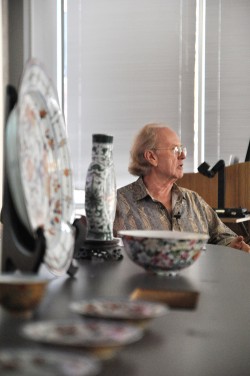Last Saturday, the PSU Institute for Asian Studies and the Lan Su Chinese Garden’s First Saturday volunteer group teamed up once again for their monthly First Saturday East Asian Program Series, which brings in speakers for the community free of charge.
The king of Qing porcelain
Last Saturday, the PSU Institute for Asian Studies and the Lan Su Chinese Garden’s First Saturday volunteer group teamed up once again for their monthly First Saturday East Asian Program Series, which brings in speakers for the community free of charge.

This month’s lecture, held in Portland State’s Urban Center building, was on the Qing porcelain of China.
“There are many different major achievements in China, and today we will have a talk that will bring three of them together,” said First Saturday volunteer group President Dennis Lee, standing by a cluster of porcelain pieces.
An audience of about 20 sat in the lecture room watching expectantly as Lee introduced the speaker for the morning.
Michael Riles gave the day’s lecture. Riles, who earned a doctorate in physical chemistry, is the owner of an Asian antique store in Portland named Retrospection. He focused on the history of porcelain in China, facts about porcelain itself and the relationship between porcelain and the landscape paintings depicted on it.
“With the urban experience, when we’re all clustered together, what happened to us is we lost two major things. The first thing we lost was freedom, and the second thing we lost was space,” Riles said. “This led us to a disassociation from nature. The focus of art became landscape, and the focus of the landscape was man.”
Riles also gave a slideshow with photographs taken from sources such as the Palace Museum in Taiwan and auction catalogs. He described the intense detail in artwork found on each porcelain piece on display, artwork that holds symbolic meaning in Asian cultures.
“To put this incredible message on one piece of porcelain seems impossible, but the Chinese did it many, many times,” he said.
Riles conveyed his expansive knowledge of Chinese porcelain, porcelain’s symbolic significance and major historical occurrences in the development of the art.
Portland resident Jane Bosket has been actively participating in the Chinese Garden for 11 years and has been attending most of the First Saturday lectures.
“I really liked Michael’s discussion of the chemical components in porcelain and how they’re made,” she commented. “I think it was good that he didn’t just talk about the culture iconography.”
For some members of the audience, this was the first lecture put on by these institutions that they had ever attended. This was true for Portland resident Jeffrey Lachman.
“[Riles] has a tremendous in-depth knowledge of this subject, and from many years of study he has developed an expertise that is not really matchable,” he said. “His analysis of each piece that was being shown and the symbolic significances of each one really stuck with me.”
Riles, who’s he’s been preparing for lectures of this nature for 40 years—“a lifetime of following Chinese Art”—explains how he came by this expertise.
“Collectors always come with the most information because they have more understanding and appreciation for it,” he said. “What’s made me an expert and what prepared me for the ranks as a chemist is that I can read the porcelain quite well because I know the manufacture of true porcelain. This is a major human achievement, not only as an art form but as a technological achievement as well.”
Anyone is welcome to attend these events.
“I think students are going to get information that they won’t get in a lecture hall, and it would really supplement their studies,” she said. “There are so many people from the community that have studied a lifetime and have a lot of knowledge in the history of art and development of art that come and share their knowledge.”
Riles emphasized that it was graduate-level instruction in Chinese art given at no cost, and he hoped the audience that attended that morning came away with a deeper interest and understanding.
“I hope they got enough interest to go start learning about the Chinese aesthetic themselves because it is probably the most balanced and virtuous aesthetics in the world,” he said. “It was built in the perspective of real human values; there is no real politics. To me, it is pure inspiration.”
The next and final lecture in this year’s First Saturday Lecture Series, taking place May 5, will feature Ina Asim, associate professor of pre-modern Chinese history at the University of Oregon. Asim’s talk is titled “Reaching Across the Continents: A Sampling of Plants from China which Influence the Gardens of Europe and the Gardening World.”
All lectures in the series are held from 9:30 to 11 a.m. in PSU’s Urban Center, room 250. They are free and open to the public.






